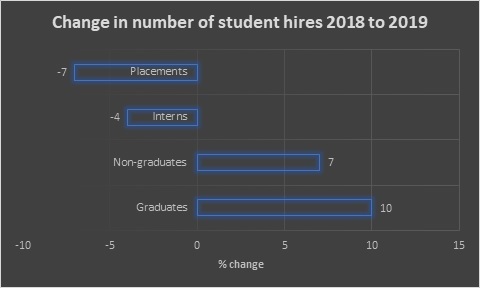ISE launches its annual student recruitment survey today. Researcher Tristram Hooley shares the headline findings.
It is easy to get despondent at recent political events. With the government in collapse and no clear path through Brexit emerging, many of us have been feeling gloomy about the future of the UK. However, it is important to remember that what is going on in Westminster can be very distant from what is going on in the real world.
Today we’ve published Inside Student Recruitment 2019 and it shows that despite the county’s political turmoil employers have been continuing to recruit new entry-level talent in a positive and optimistic way.
Resilient student recruitment market
Inside Student Recruitment 2019 is based on a survey of 153 ISE members who have collectively brought 37,389 new hires into their businesses this year.
This is important because entry-level recruitment is a sensitive indicator of the economy. What it shows is that despite all of the sound and fury in parliament, the firms that are responding to this survey have thought about the future and decided that they are going to have enough business to need to recruit large numbers of new staff.
What is more, employers are not just recruiting large numbers of new graduates and schools leavers, they are also recruiting more than they did last year.
Graduate numbers are up by 10% while non-graduate (e.g. school leavers) hires are up by 7%.
On the graduate side this has been an unusually good year as we haven’t seen this level of rise since 2013 and 2014.
We have also seen increases in salaries with the average graduate starting salary now at £29,000 (a £750 increase on last year) and the average non-graduate starting salary now at £17,417 (up by almost £1000 on last year).
The key indicators tell us that this is a good year, that employers are feeling optimistic and that they continue to value student talent both in terms of graduates and non-graduates. But, of course, not all of the news is so good. There are also some counter-indicators that suggest this might not be the whole story.
Cautious outlook
There are some surprising reductions in the number of short-term and temporary graduate hires that employers are taking on. Firms recruited 4% less interns this year than last year and offered 7% less placements.
This was largely driven by a decline in the numbers within the engineering, energy and industry sector. It would be interesting to know more about why this sector was feeling less able to take on these short-term hires. It may be about increasing pressure within the sector or about the growth of alternative forms of work experience that are displacing the internships and placements that have traditionally been recruited from higher education. This is concerning for graduates because these short-term hires have traditionally been an important route into graduate jobs.

Employers also reported other challenges in recruiting the right graduates for particular roles. For example, 41% of employers who were recruiting graduate engineers and 39% who were recruiting programmers and IT developers found these roles difficult to fill.
When asked about their long-term vision, employers expressed concerns that engineers, IT and technical and analytical roles would become even more difficult to recruit over the next five years.
The majority (53%) of employers also revealed that they were worried that either Brexit or an economic recession would negatively impact on the growth of their recruitment over the next five years.
In summary, we should be celebrating a good year in the student recruitment market, but avoiding complacency. Student recruiters, like the rest of us, have concerns about the future, but for now at least, they are generally looking on the bright side.


0 Comments